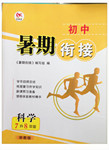
20. He reads newspapers every day to keep himself_______about what's going on in the world.
| A.inform | B.informing | C.informed | D.being informed |
 鹰派教辅衔接教材河北教育出版社系列答案
鹰派教辅衔接教材河北教育出版社系列答案 初中暑期衔接系列答案
初中暑期衔接系列答案科目:高中英语 来源: 题型:
8. A man may usually be known by the books he reads _____ by the friends he keeps.
A. as usual B. as soon as
C. as if D. as well as
查看答案和解析>>
科目:高中英语 来源:吉林省长春市希望高中2010届高三期中联合考试英语试题 题型:填空题
短文改错(共10小题,每小题1.5分,满分15分)
此题要求改正所给短文中的错误。对标有题号的每一行做出判断:如无错误,在该行右边横线上画一个勾(√);如有错误(每行只有一个错误),则按下列情况改正:
此行多一个词:把多余的词用斜线(\)划掉,在该行右边横线上写出该词,并也用斜线划掉。
此行缺一个词:在缺词处加一个漏字符号(∧),在该行右边横线上写出该加的词。
此行错一个词:在错的词下划一横线,在该行右边横线上写出改正后的词。
注意:原行没有错的不要改。
When Joe left university, he got a good work in a bike factory. 76. ____________
But after he had been worked there for some years, he decided 77. ____________
to have change, so he put a notice in several newspapers, 78. ____________
saying what experiences he had and the kind of job he would 79. ____________
like to have. One of the answers he accepted was from a man 80. ____________
was looking for a job, too. This man wrote to him, “Dear, sir, 81. ____________
when you get a new job, be kind enough to give your name and 82. ____________
address to your present boss as I have been trying to find 83. ____________
a position like yours for a long time.” After he reads the letter, 84. ____________
he suddenly realized that what he had done was real foolish. 85. ____________
查看答案和解析>>
科目:高中英语 来源:2013-2014学年四川仪陇县第二中学高二9月月考卷(解析版) 题型:阅读理解
It’s 8:30, time for John to start work. So he turns on his radio. Then he eats breakfast. As he eats, he reads his e-mail and reviews his to-do list. Then he sits on the sofa and thinks about an article he needs to write ... Wait a minute! Radio? Breakfast? Sofa? What kind of workplace is this? Well, actually it is John’s house, and he is a telecommuter — he works at home, communicating with the workplace through the Internet.
Like John, millions of people — and their employers — are finding that telecommuting is a great way to work. Telecommuters can follow their own timetables. They work in the comfort of homes, where they can also look after young children or elderly parents. They save time and money by not traveling to work. Their employers save, too, because they need less office space and furniture. Studies show that telecommuters change jobs less often. This saves employers even more money. Telecommuting helps society, too, by reducing pollution and traffic problems.
Jobs that are suited to telecommuting include writing, design work, computer programming and accounting. If a job is related to working with information, a telecommuter can probably do it.
1.From the passage we can learn that John does his job .
A. by telephone B. through the Internet
C. in his office D. away from home
2.One of the advantages of telecommuting is that you can .
A. work for several employers B. enjoy a lot of traveling
C. get along well with other workers D. work on your own schedule
3.Telecommuters change jobs less often, so .
A. their employers can save money
B. their employers will give them a higher pay
C. they can get more work experience
D. they will have a longer paid holiday
4.The underlined phrase “suited to” in the third paragraph probably means “ ”.
A. acceptable for B. bad for
C. difficult for D. fit for
查看答案和解析>>
科目:高中英语 来源:2015届河南灵宝第三高级中学高一下期第三次质量检测英语卷(解析版) 题型:阅读理解
These days, many passers-by always spot a beggar on the Jiaochangkou Street in Yuzhong District of Chongqing in southwest China.
The beggar’s name is Xia Haibo, and he was born in Meihe Village, Tianmen City of Hubei Province. Being 25 years old, he is quite a special beggar in some ways — he doesn’t beg on his knees, as other beggars do when begging. Rather, he often stands in the crowded street, either reading a book or thinking about something carefully. He also started a blog on the Internet which has been clicked more than 500,000 times. He likes reading — he has read many classical Chinese poems. He has kept writing and recently, he has planned to publish his writings.
In 1998, Xia entered Tianmen Middle School as the best student in his town. However, a year before he took the college entrance examination, he came down with a high fever and was later diagnosed (诊断) as having rheumatoid arthritis (类风湿性关节炎). In order to treat his disease, his father borrowed 60,000 yuan from relatives and friends. However, with this money, he didn’t recover from the disease. He did not want to become a burden (负担) to his family any more. So in July, 2006, he left his hometown and went to Wuhan to make a living by begging.
Begging has become a job to Xia now. However, he doesn’t plan to go on living like this. “By July 24, 2008, when I have been begging for two years, I will stop my begging life. I promise,” he said.
It is his plan that by using the money he “earns”, he will rent a small shop in his hometown and keep on writing in his spare time.
Right now, he is trying to finish a book of his own. The book, called Love Is With Me, tells about the people who helped him during his begging life.
1.The underlined word “spot” in the first paragraph is closest in meaning to “______”.
A.forgive B.record C.beat D.notice
2.When did Xia Haibo get the serious illness?
A.In 1998. B.In 2001. C.In 2000. D.In 2006.
3.How does Xia beg in the street?
A.He begs on his knees in the street.
B.He writes Chinese poems for those who like poems.
C.He reads or thinks while standing in the street.
D.He teaches people how to surf the Internet.
4. Which of the following is NOT true about Xia Haibo?
A.His dream is to have his book published.
B.He will not stop begging until he earns enough money for his future life.
C.He is writing a book to express his thanks to those who helped him.
D.He will keep writing while running a small business.
查看答案和解析>>
科目:高中英语 来源:20102011学年度江苏省高一下学期期中考试英语试题 题型:完型填空
完形填空(共20小题;每小题1分,满分20分)
请认真阅读下面短文,从短文后各题所给的A、B、C、D四个选项中,选出最佳选项,并在答题卡上将该项涂黑。
Childhood curiosity(好奇) can last a lifetime and I learned this from my son, Bill. When he was very young, I often took him to the 36 . He loved to read and often needed to 37 the books he’d read in order to borrow more books. One unintended 38 of his nonstop reading habits was that he even 39 at the dinner table. His mother, Mary, and I did our best to 40 him that, on certain social 41 , reading while dining with others was not a good thing.
Every summer the teachers at his school 42 give the students a reading list, and there was a contest to see who could read the most books. He was so 43 , and he always wanted to win. And he often 44 . But the main reason why he read so obsessively (着迷地) was that he was so 45 . He didn’t just want to learn about 46 things. He wanted to learn about everything.
We helped 47 his curiosity in every way. 48 an unfamiliar word came up in conversation, we’d turn to the 49 , looking up the word, and reading the definition aloud. Thus my son came to realize that if you have a question, the 50 exists somewhere. All you have to do is 51 it.
Bill remains as much of a 52 today as when he was a child, and he seems to 53 everything he reads. He’s often 54 to share what he’s learned with the next person he meets. He 55 reads at the dinner table, though — which is a good thing because the books he’s attracted to now are increasingly unappetizing (引不起食欲的): The Eradication of Infectious Diseases, Mosquitoes, Malaria & Man, and Rats, Lice, and History.
1. A. school B. office C. library D. museum
2. A. return B. store C. talk D. pick
3.A. advantage B. discovery C. explanation D. consequence
4.A. play B. read C. study D. laugh
5.A. convince B. promise C. warn D. advise
6.A. issues B. services C. occasions D. duties
7. A. could B. would C. should D. might
8. A. sincere B. crazy C. positive D. competitive
9.A. went B. failed C. did D. proved
10.A. curious B. confident C. diligent D. excellent
11. A. simple B. past C. any D. some
12. A. protect B. develop C. examine D. follow
13.A. Until B. If C. Though D. Because
14. A. teacher B. newspaper C. partner D. dictionary
15. A. person B. book C. answer D. matter
16. A. find B. use C. tell D. ask
17. A. speaker B. reader C. maker D. user
18.A. imagine B. believe C. create D. remember
19. A. eager B. afraid C. careful D. sure
20. A. now and again B. at all time C. no longer D. just now
查看答案和解析>>
湖北省互联网违法和不良信息举报平台 | 网上有害信息举报专区 | 电信诈骗举报专区 | 涉历史虚无主义有害信息举报专区 | 涉企侵权举报专区
违法和不良信息举报电话:027-86699610 举报邮箱:58377363@163.com